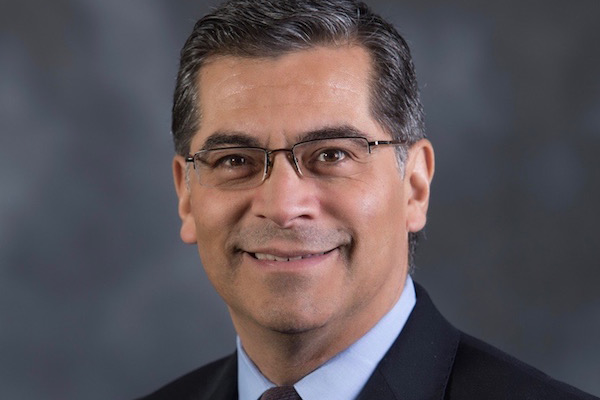National
Becerra gets defensive over Biden administration’s approach to monkeypox
HHS sec’y vaguely blames localities and ‘communities at risk’

The Biden administration’s top health official got defensive on Thursday in response to questions about its response to monkeypox, suggesting localities and “communities at risk” weren’t doing enough on prevention efforts and asserting the federal government has “done our homework” in addressing the outbreak.
Secretary of Health & Human Services Xavier Becerra made the comments during a conference call with reporters intended to highlight the federal procurement of an additional 786,000 JYNNEOS vaccines from Bavarian Nordic, which are designed to protect against smallpox and monkeypox, amid concerns over a lack of supply causing localities to restrict access to the shots.
When reporters started asking questions about whether the U.S. government could eliminate monkeypox, or simply get ahead of it and whether the disease would become endemic in the United States, Becerra became defensive and downplayed concerns about vaccine availability.
“I almost want to turn that question back at you…and ask you how many vaccines do you think we need at this stage?” Becerra said. “Now there are 330 million Americans. We could try to vaccinate all 330 million but as we’ve seen with COVID, which is far deadlier. There’s not a person who’s died from monkeypox. We’ve lost over a million people from COVID. We still haven’t seen every American get vaccinated with a vaccine that has proven itself to be effective to keep people alive.”
Although challenges have persisted in getting Americans to take now widely available COVID vaccines, the problem with the monkeypox vaccine is supply not meeting demand. The D.C. government announced it would temporarily discontinue a two-shot strategy and offer one shot, which is below the recommended federal guidelines, unless a patient is considered high risk. D.C. Health officials have said the first dose is effective for six months and they anticipate having enough vaccine within that time frame to administer the second doses. Critics have said the Biden administration has not sufficiently ramped up efforts to make vaccines widely available for a disease that has been around since the 1950s.
Meanwhile, the number of cases of monkeypox in the United States, which have occurred almost entirely among men who have sex with men, has reached 3,591. The number of cases is now the highest anywhere in the world.
“So on monkeypox, there are so far less than 5,000 cases reported,” Becerra continued. “So we’ve already made available to jurisdictions throughout the country more than 330,000 vaccines and today we’re announcing that another 786,000 are available. How many more vaccines would you say we need today?”
That’s when Becerra appeared to shift blame over criticism to the government response to localities and “communities at risk,” suggesting they weren’t doing enough to prevent monkeypox. Although Becerra didn’t elaborate exactly on what he meant by prevention for monkeypox, nor “communities at risk,” he compared such efforts to social distancing and masks during the coronavirus pandemic.
“If the response is we’re not going to expect any type of prevention work by the communities at risk, by the state and local officials, then chances are we’re going to have to go to the really high numbers of vaccines,” Becerra said. “But if everyone does their work, and remember containing the virus requires a lot of preventative work — as you know we did masks, that’s why we did social distancing with COVID — we know what we need to do pretty well on monkeypox.”
Becerra went on to promote the federal government’s efforts on monkeypox as rising to the moment, continuing to say state and local officials were responsible for not getting vaccines to populations in need.
“And so to the question: Can we not only stay ahead of this virus, but end this outbreak? Absolutely,” Becerra said. “And we believe that we have done everything we can at the federal level to work with our state and local partners and communities affected to make sure we can stay ahead of this and end this outbreak, but everybody’s got to take the oar and row. Everybody’s got to do their part. We don’t control, as you can see from our lack of data that we’ve gotten from jurisdictions, what they’re doing with their vaccines. We don’t have the authority to tell them what to do. We need them to work with us. And so, I would say that if you’re asking students in the classroom who did their homework, I will raise my hand and say that at HHS, we’ve done our homework.”
Lindsay Dawson, associate director of HIV Policy and director of LGBTQ Health Policy at the Kaiser Family Foundation, told the Washington Blade in response to Becerra’s comments the secretary has a point about the role of localities, but said current problems are at least partly attributed to “barriers at the federal level.”
“Responding to infectious disease outbreaks, including monkeypox, often requires a joint federal and state or local response,” Dawson said. “It is certainly true that local governments have a significant role to play in curbing the current outbreak and that the different decisions they make will likely foreshadow their success to some degree. That said, many of the primary tools to address the monkeypox outbreak, particularly vaccination and treatment, remain limited to date due, at least in part, to barriers at the federal level. Limited access to these tools could challenge local communities in mounting a comprehensive response in the immediate term.”
The White House
Trans workers take White House to court over bathroom policy
Federal lawsuit filed Thursday

Democracy Forward and the American Civil Liberties Union, two organizations focused on protecting Americans’ constitutional rights, filed a class-action lawsuit Thursday in federal court challenging the Trump-Vance administration’s bathroom ban policies.
The lawsuit, filed on behalf of LeAnne Withrow, a civilian employee of the Illinois National Guard, challenges the administration’s policy prohibiting transgender and intersex federal employees from using restrooms aligned with their gender. The policy claims that allowing trans people in bathrooms would “deprive [women assigned female at birth] of their dignity, safety, and well-being.”
The lawsuit responds to the executive order titled “Defending Women from Gender Ideology Extremism and Restoring Biological Truth to the Federal Government,” signed by President Donald Trump on his first day in office. It alleges that the order and its implementation violate Title VII of the Civil Rights Act of 1964, which prohibits sex discrimination in employment. In 2020, the U.S. Supreme Court ruled 6-3 that Title VII protects trans workers from discrimination based on sex.
Since its issuance, the executive order has faced widespread backlash from constitutional rights and LGBTQ advocacy groups for discriminating against trans and intersex people.
The lawsuit asserts that Withrow, along with numerous other trans and intersex federal employees, is forced to choose between performing her duties and being allowed to use the restroom safely.
“There is no credible evidence that allowing transgender people access to restrooms aligning with their gender identity jeopardizes the safety or privacy of non-transgender users,” the lawsuit states, directly challenging claims of safety risks.
Withrow detailed the daily impact of the policy in her statement included in the lawsuit.
“I want to help soldiers, families, veterans — and then I want to go home at the end of the day. At some point in between, I will probably need to use the bathroom,” she said.
The filing notes that Withrow takes extreme measures to avoid using the restroom, which the Cleveland Clinic reports most people need to use anywhere from 1–15 times per day depending on hydration.
“Ms. Withrow almost never eats breakfast, rarely eats lunch, and drinks less than the equivalent of one 17 oz. bottle of water at work on most days.”
In addition to withholding food and water, the policy subjects her to ongoing stress and fear:
“Ms. Withrow would feel unsafe, humiliated, and degraded using a men’s restroom … Individuals seeing her enter the men’s restroom might try to prevent her from doing so or physically harm her,” the lawsuit states. “The actions of defendants have caused Ms. Withrow to suffer physical and emotional distress and have limited her ability to effectively perform her job.”
“No one should have to choose between their career in service and their own dignity,” Withrow added. “I bring respect and honor to the work I do to support military families, and I hope the court will restore dignity to transgender people like me who serve this country every day.”
Withrow is a lead Military and Family Readiness Specialist and civilian employee of the Illinois National Guard. Previously, she served as a staff sergeant and has received multiple commendations, including the Illinois National Guard Abraham Lincoln Medal of Freedom.
The lawsuit cites the American Medical Association, the largest national association of physicians, which has stated that policies excluding trans individuals from facilities consistent with their gender identity have harmful effects on health, safety, and well-being.
“Policies excluding transgender individuals from facilities consistent with their gender identity have detrimental effects on the health, safety and well-being of those individuals,” the lawsuit states on page 32.
Advocates have condemned the policy since its signing in January and continue to push back against the administration. Leaders from ACLU-D.C., ACLU of Illinois, and Democracy Forward all provided comments on the lawsuit and the ongoing fight for trans rights.
“We cannot let the Trump administration target transgender people in the federal government or in public life,” said ACLU-D.C. Senior Staff Attorney Michael Perloff. “An executive order micromanaging which bathroom civil servants use is discrimination, plain and simple, and must be stopped.”
“It is absurd that in her home state of Illinois, LeAnne can use any other restroom consistent with her gender — other than the ones controlled by the federal government,” said Michelle Garcia, deputy legal director at the ACLU of Illinois. “The Trump administration’s reckless policies are discriminatory and must be reversed.”
“This policy is hateful bigotry aimed at denying hardworking federal employees their basic dignity simply because they are transgender,” said Kaitlyn Golden, senior counsel at Democracy Forward. “It is only because of brave individuals like LeAnne that we can push back against this injustice. Democracy Forward is honored to work with our partners in this case and is eager to defeat this insidious effort to discriminate against transgender federal workers.”
U.S. Military/Pentagon
Coast Guard’s redefinition of hate symbols raises safety concerns for service members
Revoked policy change sparked immediate condemnation

The U.S. Coast Guard has reversed course on a recent policy shift that removed swastikas — long used by hate-based groups to signify white supremacy and antisemitism — from its list of “hate symbols.” After widespread backlash, the symbols, initially reclassified as “potentially divisive,” have been restored to their previous designation as hate symbols.
Under the now-revised policy, which was originally published earlier this month, symbols including swastikas and nooses were labeled “potentially divisive,” a change officials said could still trigger an investigation and potential disciplinary action, including possible dishonorable discharge.
The Washington Post first reported the change on Thursday, outlining how the updated guidance departed from earlier Coast Guard policy.
According to the November 2025 U.S. Coast Guard policy document, page 36 (11–1 in print):
“Potentially divisive symbols and flags include, but are not limited to, the following: a noose, a swastika, and any symbols or flags co-opted or adopted by hate-based groups as representations of supremacy, racial or religious intolerance, or other bias.”
This conflicted with the February 2023 U.S. Coast Guard policy document, page 21 (19 in print), which stated:
“The following is a non-exhaustive list of symbols whose display, presentation, creation, or depiction would constitute a potential hate incident: a noose, a swastika, supremacist symbols, Confederate symbols or flags, and anti-Semitic symbols. The display of these types of symbols constitutes a potential hate incident because hate-based groups have co-opted or adopted them as symbols of supremacy, racial or religious intolerance, or other bias.”
The corrected classification now reads:
“Divisive or hate symbols and flags are prohibited. These symbols and flags include, but are not limited to, the following: a noose, a swastika, and any symbols or flags co-opted or adopted by hate-based groups as representations of supremacy, racial or religious intolerance, anti-semitism, or any other improper bias.”
The revised policy also explicitly prohibits the display of any divisive or hate symbols, stating they “shall be removed from all Coast Guard workplaces, facilities, and assets.”
In addition to the reclassification, the earlier policy change had instituted a significant procedural shift: while past policy placed no time limit on reporting potential hate incidents, the new guidance required reports of “potentially divisive” symbols to be filed within 45 days.
This shortened reporting window drew immediate criticism from within the service. One Coast Guard official, speaking to the Post, warned that the new structure could deter reporting, particularly among minority service members.
“If you are at sea, and your shipmate has a swastika in their rack, and you are a Black person or Jew, and you are going to be stuck at sea with them for the next 60 days, are you going to feel safe reporting that up your chain of command?” the official said.
The Coast Guard reversed course following this backlash, reverting to a Biden-era classification and removing the “potentially divisive” language from the policy.
These rapid changes follow a directive from Defense Secretary Pete Hegseth, who ordered a sweeping review of hazing, bullying, and harassment policies, arguing that longstanding guidelines were “overly broad” and were “jeopardizing combat readiness, mission accomplishment, and trust in the organization.”
After the Post’s reporting, senior Coast Guard leadership attempted to reassure service members that the updated language would not weaken the service’s stance on extremism. In a message to members — obtained by ABC News — Commandant Adm. Kevin Lunday and Master Chief Petty Officer of the Coast Guard Phil Waldron addressed concerns directly.
“Let me be absolutely clear: the Coast Guard’s policy prohibiting hate and discrimination is absolute,” the message said. “These prohibited symbols represent repugnant ideologies that are in direct opposition to everything we stand for. We have zero tolerance for hate within our ranks.”
Still, the policy changes prompted swift political reaction.
U.S. Sen. Jacky Rosen (D-Nev.), a member of the Senate Commerce Committee, urged the Trump-Vance administration to reverse the modifications before they took effect.
“At a time when antisemitism is rising in the United States and around the world, relaxing policies aimed at fighting hate crimes not only sends the wrong message to the men and women of our Coast Guard, but it puts their safety at risk,” Rosen said in a statement to the Post.
The controversy comes as federal agencies face growing scrutiny over how they regulate symbolic expression and disciplinary standards. Just days earlier, FBI Director Kash Patel issued a letter concerning the dismissal of David Maltinsky, a veteran FBI employee in training to become a special agent. Maltinsky was “summarily dismissed” after the “inappropriate display” of a Pride flag at the Los Angeles FBI field office — a flag he had flown with his supervisors’ approval.
Taken together, the incidents underscore escalating tensions across federal law enforcement and military branches over the policing of symbols, speech, and expression — at a time when debates around extremism, diversity, and LGBTQ visibility remain deeply polarized.
Federal Government
HHS ‘peer-reviewed’ report calls gender-affirming care for trans youth dangerous
Advocates denounce document as ‘sham science’

The U.S. Department of Health and Human Services on Nov. 19 released what it called an updated “peer reviewed” version of an earlier report claiming scientific evidence shows that gender-affirming care or treatment for juveniles that attempts to change their gender is harmful and presents a danger to “vulnerable children.”
“The report, released through the Office of the Assistant Secretary of Health, finds that the harms from sex-rejecting procedures — including puberty blockers, cross-sex hormones, and surgical operations — are significant, long term, and too often ignored or inadequately tracked,” according to a statement released by HHS announcing the release of the report.
“The American Medical Association and the American Academy of Pediatrics peddled the lie that chemical and surgical sex-rejecting procedures could be good for children,” said HHS Secretary Robert F. Kennedy Jr. in the HHS statement, “They betrayed their oath to first do no harm, and their so-called ‘gender affirming care’ has inflicted lasting physical and psychological damage on vulnerable young people,” Kennedy says in the statement.
The national LGBTQ advocacy organizations Human Rights Campaign and GLAAD issued statements on the same day the HHS report was released, denouncing it as a sham based on fake science and politics.
HRC called the report “a politically motivated document filled with outright lies and misinformation.”
In its own statement released on the same day the HHS report was released, HRC said HHS’s so-called peer reviewed report is similar to an earlier HHS report released in May that had a “predetermined outcome dictated by grossly uninformed political actors that have deliberately mischaracterized health care for transgender youth despite the uniform, science backed conclusion of the American medical and mental health experts to the contrary.”
The HRC statement adds, “Trans people’s health care is delivered in age-appropriate, evidence-based ways, and decisions to provide care are made in consultation with doctors and parents, just like health care for all other people.”
In a separate statement, GLAAD CEO Sarah Kate Ellis called the HHS report a form of “discredited junk science.” She added the report makes claims that are “grossly misleading and in direct contrast to the recommendations of every leading health authority in the world … This report amounts to nothing more than forcing the same discredited idea of conversion therapy that ripped families apart and harmed gay, lesbian, and bisexual young people for decades.”
In its statement announcing the release of its report, HHS insists its own experts rather than those cited by its critics are the ones invoking true science.
“Before submitting its report for peer review, HHS commissioned the most comprehensive study to date of the scientific evidence and clinical practices surrounding the treatment of children and adolescents for ‘gender dysphoria,’” the statement continues. “The authors were drawn from disciplines and professional backgrounds spanning medicine, bioethics, psychology, and philosophy.”
In a concluding comment in the HHS statement, Assistant Secretary for Health Brian Christine says, “Our report is an urgent wake-up call to doctors and parents about the clear dangers of trying to turn girls into boys and vice versa.”
-

 District of Columbia5 days ago
District of Columbia5 days agoD.C. LGBTQ bars ‘hanging in there’ amid tough economy
-

 District of Columbia3 days ago
District of Columbia3 days agoNew LGBTQ bar Rush set to debut
-

 National5 days ago
National5 days ago213 House members ask Speaker Johnson to condemn anti-trans rhetoric
-

 Virginia4 days ago
Virginia4 days agoRepealing marriage amendment among Va. House Democrats’ 2026 legislative priorities




















